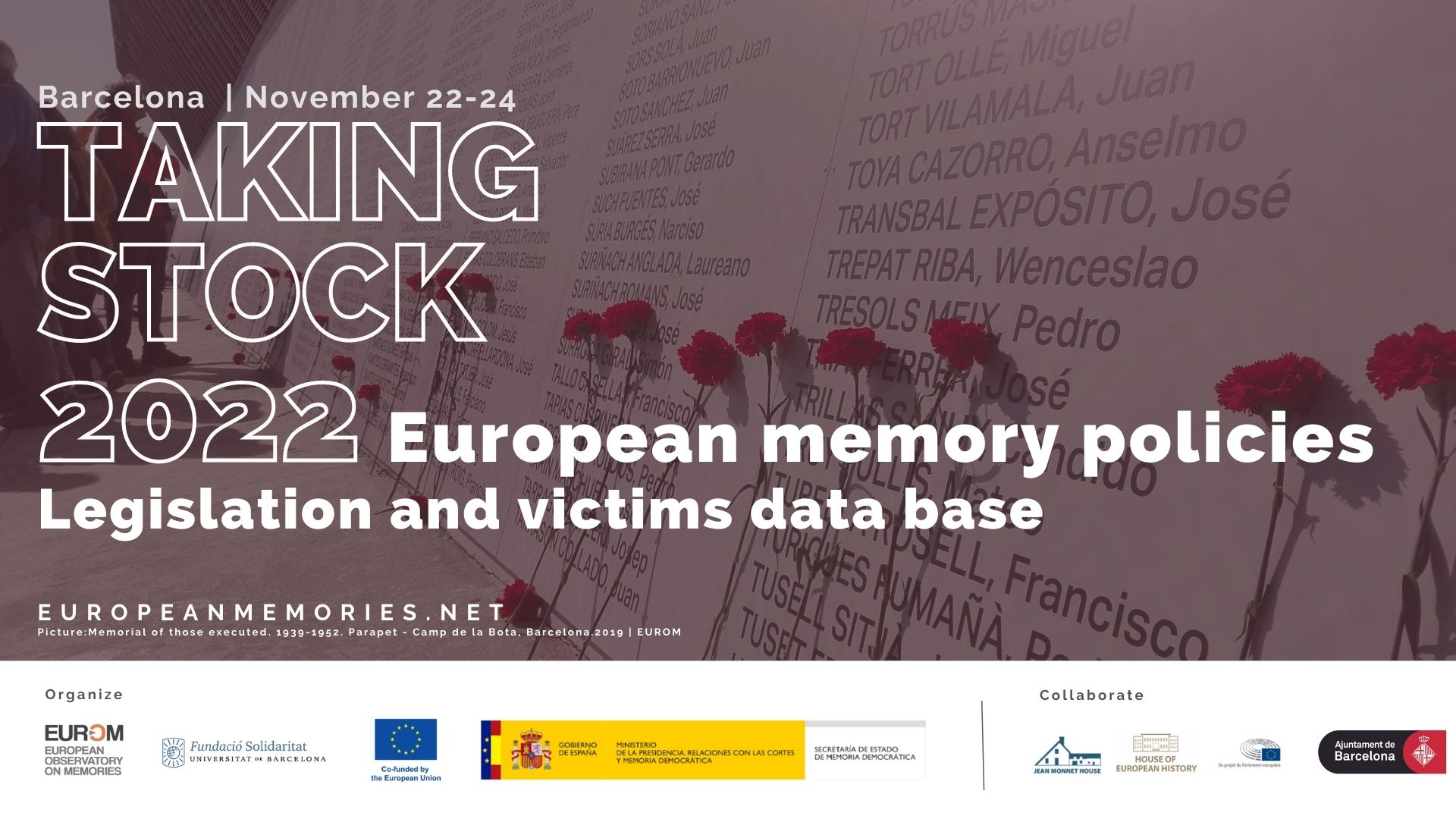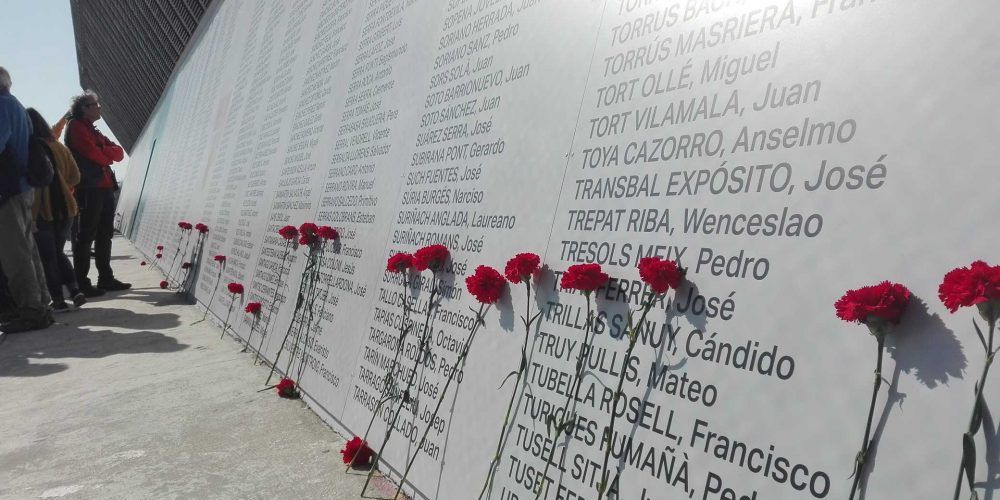- The fifth edition of the annual meeting of the EUROM network will take stock of the European memory policies and highlight the progress and challenges in the development of victims databases underwritten by legislation, like the new Spanish Law;
- The meeting is co-organized by Spain’s State Secretary of Democratic Memory and will bring to discussion different international experiences on databases and the various debates on the transmission of this kind of information;
- It will also be an opportunity to analyze the main aspects of the new Spanish law and the current perspectives on memory laws in Europe.
Cover image: Memorial of those executed. 1939-1952. Parapet – Camp de la Bota, Barcelona.2019 | EUROM
Attendance is free but previous registration is required
The fifth edition of the meeting “Taking Stock of European memory policies” has three main axes: to make an annual assessment of the memory policies in Europe, to study different experiences on victims’ databases, and present the new Spanish Law of Democratic Memory.
The conference will furthermore discuss the future of memory policies and the strategies for their promotion, fostering the dialogue between various institutions, networks and organizations. The meeting will discuss national and international experiences on victims’ databases and will present the progress of the work on the database of victims of the Spanish civil war prepared by Spain’s Secretary of State for Democratic Memory – one of the aspects contemplated in the recently approved memory law.
The event is organized by the European Observatory on Memories (EUROM) of the Solidarity Foundation of the University of Barcelona and the Secretary of State for Democratic Memory (SEMD) in collaboration with the Jean Monnet House, the House of European History and the Department of Democratic Memory of the Barcelona City Council. It is co-funded by the programme Citizens, Equality, Rights and Values of the European Union.
Programme
November 22
Venue: Aula Magna of the University of Barcelona Historical building (Gran Via de les Corts Catalanes, 585)
6:00 pm – 6:30 pm – Opening session.
Welcome and introduction by Jordi Guixé, director of the European Observatory on Memories (EUROM) of the University of Barcelona’s Solidarity Foundation
- Joan Guàrdia, Rector of the University of Barcelona
- Ana Gallego, Director-General of Justice, European Commission [on-line]
- Constanze Itzel, Head of Unit – House of European History, European Parliament [on-line]
- Jordi Rabassa, Councillor of Democratic Memory, Barcelona City Council.
- Fernando Martínez, Secretary of State for Democratic Memory of the Ministry of the Presidency, Relations with the Courts and Democratic Memory
6:30 pm – 8:00 pm – Discussion Panel 1
Memory policies in Europe today
Presented and moderated by Oriol López (EUROM):
- Evaluation of the CERV Programme
Gilles Pelayo, European Commission, Citizens and EU Values (Directorate-General for Justice and Consumers)
- Best practices
European Memories School Project
Oriol López, coordinator of the EUROM
Debora Righetti, Jean Monnet House [on-line]
European Network Remembrance and Solidarity (ENRS)
Rafal Rogulski, director of the ENRS
Mémorial de la Shoah
Morgane Knepper and Zelie Daul, Memorial de la Shoah [online]
EUROCLIO-European Association of History Educators
Steven Stegers, Executive Director of EUROCLIO
Spains’ Secretary of Democractic Memoy (SEMD)
Almudena Cruz Yábar, head of the support unit of the General Directorate for Democratic Memory
November 23
Venue: Auditorium of the former prison La Model (c/ d’Entença 155)
09:30 am – 11:00 am – Discussion panel 2
Victims databases. An international perspective
Presented and moderated by Gerard Corbella (La Foneria)
- Yad Vashem’s governance model and its victims database: The central database of Shoah Victims’ Names. Alexander Avram, director of the Hall of Names of Yad Vashem (Israel) [on-line]
- Data processing and dissemination in the Arolsen Archives. Giora Zwilling, Head of Archives, Arolsen Archives (Germany) [on-line]
- Unified Registry of Victims of State Terrorism (RUVTE). Silvia San Martín, Coordinator of the Unified registry of victims of State Terrorism of the National Memory Archive (Argentina) [on-line]
11:00 am -11:30 am – Coffee break
11:30 am – 1:30 pm – Discussion panel 3
Victims databases models
Presented and moderated by Jaime del Rey (Secretary of State for Democratic Memory).
- Navarre. Josemi Gastón and César Layana, Navarre Institute of Memory
- Galicia. Xabier Bugeiro Alonso, project Nomes e voces, Histagra Research Group – Universidad de Santiago de Compostela
- Castilla-La Mancha. Ainhoa Campos Posada, coordinator of the Democratic Memory Project developed by the Universidad de Castilla – La Mancha
- Canary Islands. Víctor Manuel Ramírez Pérez , general director of Diversity Department of the Canary Islands Government
- Valencia. Eva María García Barambio, Delegation of Historical Memory of the Provincial Council of Valencia
1:30 pm – 4:30 pm – Lunch break
4:30 pm -5:30 pm Discussion panel 4
Data protection, international and national experiences
Presented and moderated by Celeste Muñoz (EUROM-UNED)
- The protection of personal data in the context of victim censuses. Arye Schreiber, lawyer and collaborator on a research project on archives and privacy with the Arolsen Archives.
- The right to truth and the protection of personal data: between the duty to remember and the right to be forgotten. Antonio González Quintana, member of the Executive Committee of the Archives and Human Rights Section of the International Council on Archives.
- Jesús Rubí Navarrete, Spanish Data Protection Agency
5:30 pm – 6:30 pm – Break
6:00 pm – 7:00 pm – Discussion panel 5
Memory laws and present legislation
Presented and moderated by Diego Blázquez (general-director of Democratic Memory of Spain)
- European memory policies and legislation. Aline Sierp, Maastricht University – Memory Studies Association [on-line]
- Towards a new Spanish legislation. Rafael Escudero, Universidad Carlos III, Madrid.
November 24
Venue: Aula Magna of the University of Barcelona Historical building (Gran Via de les Corts Catalanes, 585)
10:00 am – 11:00 am Discussion panel 6
The Spanish Victims Census
Presented and moderated by José Luis Muñoz (Secretary of State for Democratic Memory of Spain)
- Pilot project. José Luis Muñoz Romano, Secretary of State for Democratic Memory.
- Conceptualisation of the Spanish Victims Census. Gerard Corbella (La Foneria) and Àlex Peña (Render Communications)
- The democratic memory bank of Catalonia. Eulàlia Mesalles Godoy, Head of Studies and Activities of the Catalan General Directorate of Democratic Memory
11:00 am – 11:30 am – Coffee break.
11:30 am – 1:00 pm – Discussion panel 7
Spanish law, development and challenges
Presented and moderated by Rosa Ana Alija (University of Barcelona)
- Baltasar Garzón, Fundación Internacional Baltasar Garzon (FIGBAR)
- Juan Carlos García Bravo, Asociación de la Memoria Social y Democrática (AMESDE)
- Sònia Olivella, Ateneu de Memòria Popular
- Ramon Alberch, Arxivers Sense Fronteres.
- Carlos Jiménez Villarejo, Legal scholar
1:00 p.m. – 1:15 p.m. Final thoughts
- Diego Blázquez, General-Director of Democratic Memory of the Ministry of the Presidency, Relations with the Courts and Democratic Memory
- Alfons Aragoneses, General-Director of Democratic Memory of the Generalitat of Catalonia
- Jordi Guixé, Director of the European Observatory on Memories (EUROM) of the University of Barcelona’s Solidarity Foundation

Related videos
Playlist with the full conference (with English interpretation)
Playlist with the full conference (with Spanish interpretation)


